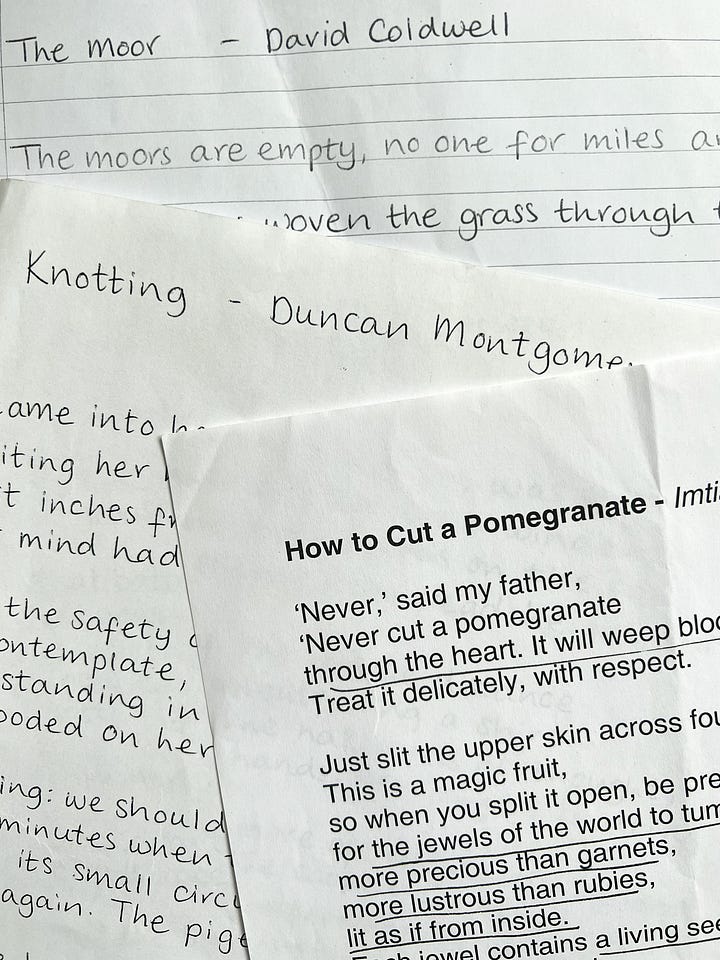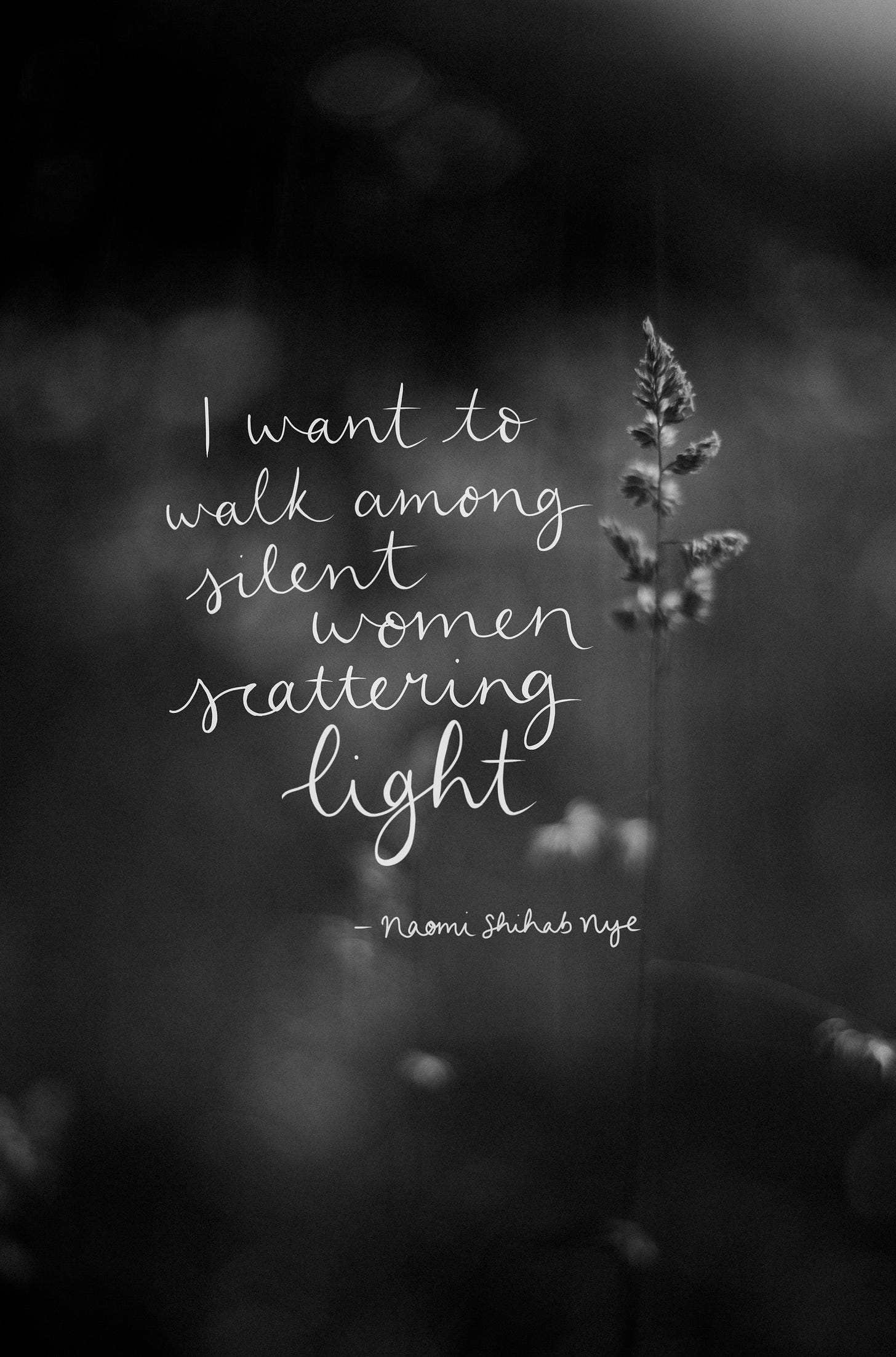Curious Voices
Why speaking isn't about performing, but about exploring.
It’s a strange thing hearing yourself speak. We all know that jarring feeling of playing back a recording of ourselves, “That’s what other people hear?! Uhhh.” The immediate recoil, before wondering how on earth we can make ourselves sound less nasally, weird, and well, just more like what we thought we sounded like.
Lately I’ve been thinking about the act of using our voices. Not necessarily from the slightly exhausted message of ‘speaking your truth’, but more the basic physical act itself - of speaking the sound of your voice into the air. And listening.
It’s odd to think that our two main senses give us versions of ourselves that are different to how other people experience us. We simply cannot get outside of our bodies, dammit. Oh, to have the same perspective of ourselves as the rest of the world and for the gap to close - for our mirrors to flip and our ears to shift.
I’m pretty sure that most people could live happily without the need to hear themselves, far more than they could live without seeing themselves in photos. Choosing photography as a career feels slightly more doable than trying to convince people they need to nurture their relationship with their voice.
However, as I sit at my desk and type this to you, on my left sits a microphone ready for these words to be recorded, and to my right is a folder filled to the brim with printed poems. As someone who also recoiled with all the bubbling cringe a body could produce not so long ago, I didn’t expect myself to eventually become an enthusiast for reading aloud, let alone recording yourself doing so (and publishing it on the internet, for that matter…).
An Opening
In 2015 I began down a five-year road of connection with a group of people which was centred around speaking and listening.
I was facilitating a weekly shared reading group at an assisted living community, and in those years I saw the undeniable power in reading aloud, and in what helped people to speak.
The group couldn’t exist without our voices, of course, but there also had to be curiosity for people to want to speak. Poetry itself wasn’t enough. There needed to be a pull for people to open their mouths in the first place.
There had to be an opening.
The main focus in my training before I met my group for the first time was to ‘not know’ as much as possible - to have no right answers, to arrive to the group each week not just with poetry but also question marks and empty spaces. To pause. To wonder, and wonder some more.
After a few readings out loud of a poem and some prepared prompts, the group would begin to move - we had committed to the space of not-knowing, of loosening ourselves into an hour of curiosity each week.
People gradually found themselves eager to speak, some more than others, but as time went on even the quieter members decided to offer their openings into the group; a memory linked to a few words in the poem; moments they forgot they knew; meanings to words and meanderings to emotions of unexpected feelings. Thoughts connecting from one to another, and from one person to another.
It was a beautiful thing to see people unfold themselves, to be open to wherever words might take us. Years in, and despite becoming more and more familiar with the group, there were still unexpected moments, secrets told and confidence grown.
We weren’t there to be poetry experts, and we weren’t there to expertly speak.
We were there to explore.
A Poetic Surprise
In March 2020 I was suddenly without the group. Once lockdown hit there was no preparing poems for people, no weekly curiosity or connections being made. There was a strange poetry shaped gap which I didn’t really know what to do with.
April came and I gradually found myself reading aloud again. It was America’s National Poetry Month, and so I decided to jump on it by doing a poetry reading on Instagram every day. Just like with the group, in my mind it was for other people’s ears - I wanted them to get something from a poem they might not have heard before, and of course I wanted to keep my connection with poetry moving for myself, too.
What I hadn’t fully considered was the value in reading a poem aloud just for yourself. As I began sifting through the group’s folder of poems, choosing ones to share from the old passages we’d visited together, I started to find a comfort in speaking those familiar lines. To nobody’s ears but mine.
With each record button pressed, each re-do of a video before I hit ‘Share’, I was finding myself in a sort of meditative place, the repetition, the words moving and dissolving into something else.
I began just reading them for myself, alongside the sharing online. It confirmed to me what I knew from the group - that reading out loud doesn’t have to be a performance. It can be an exploration, a chance for you to move with something, to look in a new way.
And it was that which kept me sharing online, too; I wasn’t there to show people how fantastic of a speaker I am (I’m not), and how sure we should all be about what this particular poem means (we shouldn’t be). No. I was there to move, and perhaps someone else might find themselves moving, too.
So often we stop ourselves from speaking because we’ve unknowingly chained ourselves to a state of needing to know, of there being a clear ending to our words, a conclusion packaged up and ready to be received in just the right way.
The act of reading a poem out loud can help free us from that. And not just in a group setting either, but right here, right now, with your voice, for your own ears. As powerful as groups are, there’s still good to be found in reading out loud while you’re alone.
Words not written by you - so there’s one less attachment, one less chance for judgment - and words moving through you in a slightly new way each time you speak them.
Read a poem in your mind and you move, but put it into the air with the sound of your voice and you’ll find yourself moving in different ways; you’ll be moving closer to the poem, but also to yourself.
Make room for yourself to be surprised and see where your voice might take you.
Here are a few passages from poems we did in our group, which you might enjoy reading out loud - to yourself, or someone else.


From ‘The Moor’ by David Coldwell
There has never been anyone here. The cotton grass Shimmers in the sunlight, fields of silver white Crossed by cinder and stone. Shadows of clouds race And the land flickers like an old film. Sometimes, You said, it's all we need to be. We are miles From anywhere and I swear I can smell the sea.
From ‘How to Cut a Pomegranate’ by Imtiaz Dharker
Afterwards, I tried to make necklaces of pomegranate seeds. The juice spurted out, bright crimson, and stained my fingers, then my mouth. I didn't mind. The juice tasted of gardens I had never seen, voluptuous with myrtle, lemon, jasmine, and alive with parrots' wings.
From ‘Knotting’ by Duncan Montgomery
Knotting: we should more often use that word, those minutes when the cooped-up mind eludes its small circumference till we rise apart again. The pigeons leapt their perch to settle lower; her mind strayed, resting there, alighting on her fingers, in her hair.
Fragments Of Light
The Reader - The charity where I volunteered for many beautiful years of shared reading.
StoryCorps - While I was writing this post, I suddenly remembered Story Corps, something I used to listen to quite a bit - a perfect mix of recorded voices and curiosity. A preservation of humanity and our stories.
Wordless Music - A Spotify playlist void of voices which helps me to find my own, especially while I write.
‘Voices’ a poem by Naomi Shihab Nye - Last week’s International Women’s Day had me remembering this poem, one that I did with my poetry group just before lockdown hit. That’s another thing about reading aloud - you’ll find yourself making connections to poems in certain moments once they’ve burrowed into your subconscious. Or your poetry archive in your head, it sometimes feels. This was also the poem that sparked the journey of this post. Two lines in particular: ‘I want to walk among silent women scattering light.’ ‘To lift whatever cloud it is made them believe speaking is for others.’

Where did these thoughts take you? I’m eager for these posts to go beyond the full stop in my writing. Come say hello in a comment or hit reply - even if your thought is incomplete. In fact, especially if it’s incomplete!
Any unfinished contemplations are welcome here…







Katy, I can imagine picking up a magazine with one of those beautiful illustrated covers, and finding these words nestled inside. I loved listening to you read them, that was magic ✨